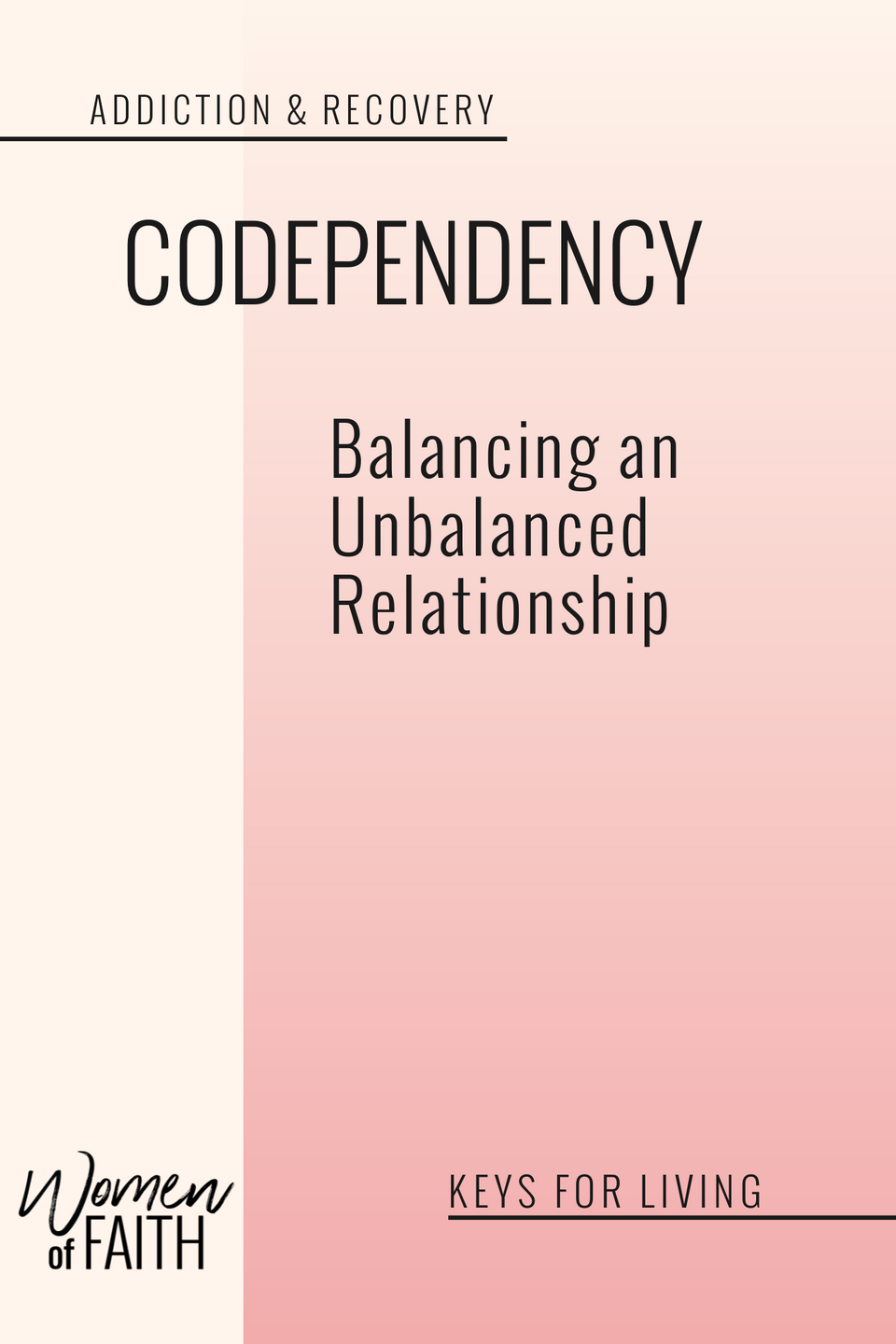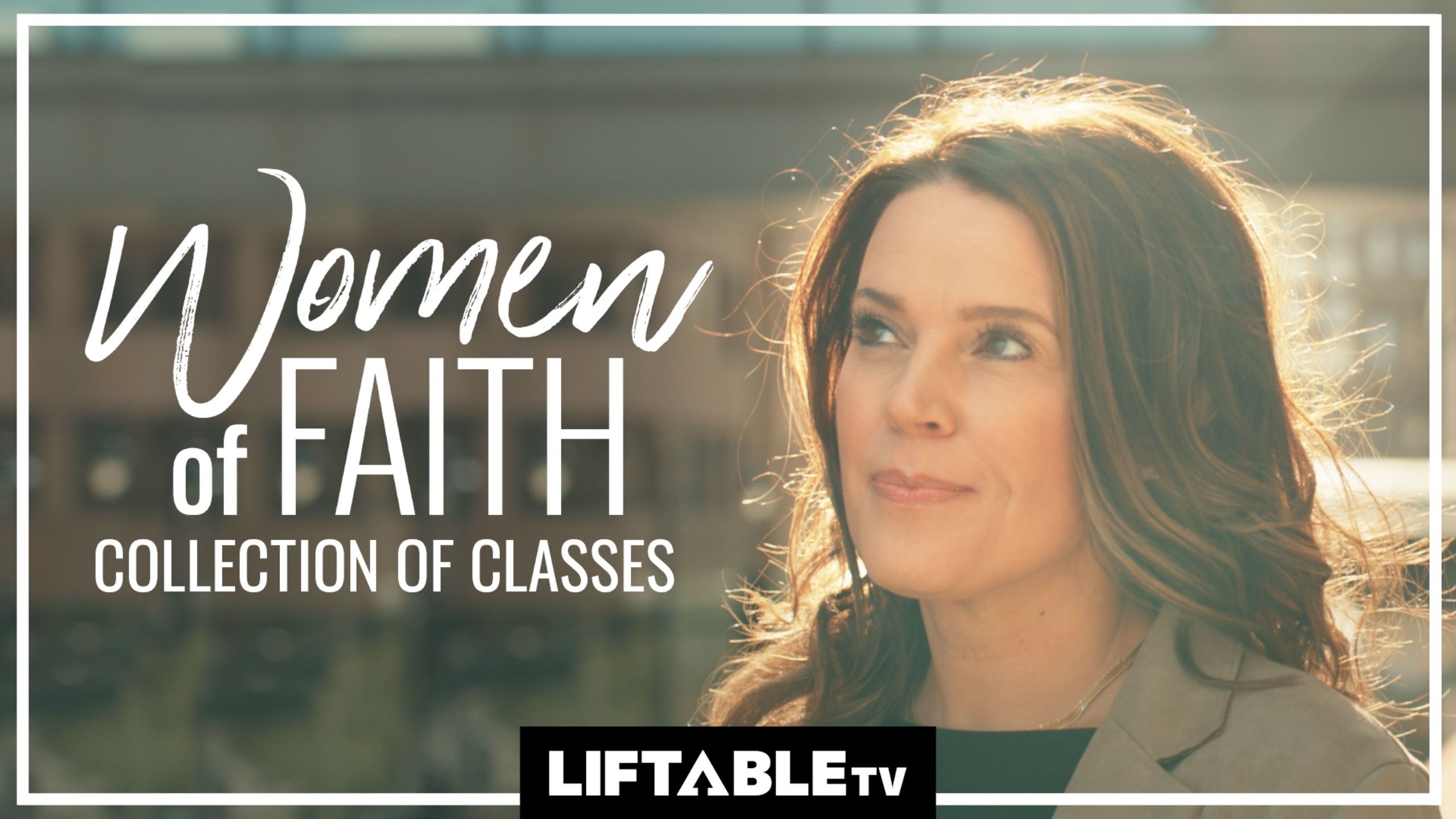CODEPENDENCY

E-BOOK
Ready to start reading right now?
Download now for a complete and comprehensive reading on CODEPENDENCY.
KEYS FOR LIVING BOOKS
The Women of Faith Keys for Living books are designed for those looking for help and for those looking to help, the Keys for Living were created to help you … and help you help others. The Keys are great for personal study and growth, small group studies, and for teaching and training purposes.
What to Expect in the Keys: You’ll discover God’s wisdom and guidance in a simple format.
- Definitions help you understand the topic from God’s perspective.
- Characteristics give insight into the different aspects of the topic.
- Causes shed light on the underlying issues related to the topic.
- Steps to Solution (Step-by Step) show you how to be transformed, walk in freedom and live in victory.
BALANCING AN UNBALANCED RELATIONSHIP
The Need to Be Needed
Codependency is like a relationship addiction. It creates an unhealthy dependence on others and can lead to being controlled or manipulated. In the Women of Faith resources, learn how you can break free from codependency, how to establish healthy relationships, and how only God can satisfy your deepest needs.
You’ve probably heard about getting hooked on drugs or alcohol or being glued to a slot machine from sunup to sundown, but is it possible to actually become addicted . . . to a person? Sadly, the answer is Yes! Codependency is a relationship addiction. Comparable to depending on false gods that are powerless to help, or depending on a broken water well that won’t hold water, it simply won’t work! With the Women of Faith resources, find ways to break the chains of relationship addiction and foster a renewed commitment to keep Christ first in your life.
Practical Tools and Resources to Go Deeper!
SPIRITUAL STRENGTH | LIFE LEADERSHIP | REAL RELATIONSHIPS

NOT SURE ON HOW TO START?
LEARN: WHAT IS GOD'S HEART ON CODEPENDENCY?
Get your free Key to Hope on CODEPENDENCY. The download will be sent to your email.
WOMEN OF FAITH SHOW with ALITA REYNOLDS
Inspiring conversations that will encourage you to live the life you were created for.
Do you want to experience a deeper relationship with Jesus?
Do you need some encouragement that your story has a purpose?
Join Alita Reynolds, the President of Women of Faith, as she and her featured guests inspire you to live the life you were created for and equip you to walk more fully in God’s purpose for your life.
Whatever your story, your life matters, you belong, and God wants you to live victoriously. You’ll meet a wide range of guests who impact the kingdom in meaningful ways every day. Their stories will inspire you to believe that when we walk by faith, ANYTHING is possible.
COLLECTION OF CLASSES
Take a deep dive into complete and comprehensive teaching.
Learn with our collection of classes found by subscribing today PLUS receive so much more.
Our Women of Faith Collection of Classes are designed to help you and those you care about deepen your relationship with Jesus and make practical changes in your life. Sign up to watch the Women of Faith Collection of Classes at LIFTABLEtv and start moving toward the FREEDOM you crave.
Whatever you’re facing, your life matters, and God wants you to live in victory. Today is a great day to begin.
What Is Dependency?
From conception to death, God created us to be dependent, not on another person or thing but on Him alone.
- Dependency is a reliance on something or someone else for support or existence.
- Dependency can be either negative or positive, such as being dependent on cocaine versus being dependent on Christ.
- Dependencycan be an addiction to any object, behavior, or person that represents an underlying attempt to get emotional needs met.
“There is a way that appears to be right, but in the end it leads to death.”
(Proverbs 14:12)
God Wants You to Depend on Him
- To totally relyon Him, not on people or things or self-effort. (Psalm 73:26)
- To believe that He will meet all of your needs. You can safely reveal your hurts, your fears, and your needs to God. (Isaiah 58:11)
- To trustin Him to take care of your loved ones. (Psalm 62:8)
- To rely on Christ, whose life in you will enable you to overcome any destructive dependency. (1 John 4:4)
Common Codependent Relationships
In the examples below, the first person is dependent on the second person and the second person is actually the codependent one in the relationship ... needing to be needed.
- A wife is excessively helpless around her husband ... and the husband needs his wife to stay helpless.
- A husband is excessively needy in how he relates to his wife ... and the wife needs him to stay needy.
- A student is excessively tied to a teacher ... and the teacher needs the student to stay tied to him/her.
- A child is excessively pampered by the parent ... and the parent needs the child to stay in need of pampering.
- An employee is excessively entangled with an employer ... and the employer needs the employee to stay entangled.
- A friend is excessively fixated on another friend ... and that person needs the friend to stay fixated.
- A counselee is excessively clinging to a counselor ... and the counselor needs the counselee to continue clinging.
- A disciple is excessively dependent on a discipler ... and the discipler needs the disciple to stay dependent.
- A spiritual seeker is excessively leaning on a spiritual leader ... and the leader needs the seeker to continue leaning.
When we have a misplaced dependency, we have a misplaced trust. We are excessively trusting in the relationship to provide more than God intended. The Psalms describe a misplaced trust...
“Some trust in chariots and some in horses, but we trust in the name of the Lordour God.”
(Psalm 20:7
The Codependent Relationship Profile
Both...
- Are in denialHave difficulty establishinghealthy, intimate relationships.
- Have difficulty settingboundariesHave one other addictionother than the relationship.
- Have a false sense of security.
- Become jealous and possessive.
- Control and manipulate.
- Struggle with low self-worth.
- Violate their consciences.
- Experience extreme ups and downs.
- Fear abandonment.
- Feel a loss of personal identity.
- Feel trapped in the relationship.
“I find more bitter than death the [person] who is a snare, whose heart is a trap and whose hands are chains.”
(Ecclesiastes 7:26)
Stages of Childhood Development
God bestows on parents the major responsibility of nurturing their children so that they will not be love-starved—an emotional state that sets them up to “look for love in all the wrong places.”
The Helpless Stage
Babies need to bond with their parents because they are helpless and totally dependent for all of their basic needs.
The Pushing Away Stage
Toddlers need to begin to push away from their parents as a way of exploring their environment and testing boundaries.
The Conflict Stage
Young children need to learn proper ways of resolving conflict as they begin to test their parents’ rules.
The Independent Stage
Preadolescent children need to grow in independence, but they still need direction and support from their parents.
The Sharing Stage
Adolescents need to learn mutual give-and-take and even sacrificial sharing from their parents as they begin to pursue involvement within their own groups.
hildren who grow up being emotionally needy and who are not allowed to learn the skills necessary for forming healthy, adult relationships never learn healthy independence. They have difficulty speaking the truth, asking for what they want, and setting boundaries. They become codependent adults who are addicted to unhealthy relationships because they never learned to think as healthy adults. ..
“Brothers and sisters, stop thinking like children. ... but in your thinking be adults.”
(1 Corinthians 14:20)
The Road to Freedom
- Recognize that you are overly dependent on another person, then choose to place your dependency on God. (Mark 12:30)
- Examine your patterns of codependent thinking. (Acts 24:16)
- Let go of your “super responsible” mentality. (Exodus 18:17–18)
- Extend forgiveness to those who have caused you pain. (Colossians 3:13)
- Appropriate your identity in Christ. (Galatians 2:20)
- Set healthy boundaries. (Proverbs 27:12)
- Exchange your emotional focus for a spiritual focus. (Psalm 119:35–37)
Key Verse to Learn
One of the best Scriptures in the Bible that can be applied to codependency is Galatians 1:10. It redirects our focus from the people around us to God, whose approval and pleasure we must seek foremost.
The apostle Paul is emphatic about our priority relationship and declares his disinterest in pleasing men. Like Paul, we must put “first things first” or else our relationships will never have the peace and fulfillment that God desires for us. ...
“Am I now trying to win the approval of human beings, or of God? Or am I trying to please people? If I were still trying to please people, I would not be a servant of Christ.”
(Galatians 1:10)
Key Passage to Read
Galatians 6:1–5
Grace Filled Words
“Do not fear, for I am with you; do not be dismayed, for I am your God. I will strengthen you and help you; I will uphold you with my righteous right hand.”
Isaiah 41:10
“Am I now trying to win the approval of human beings, or of God? Or am I trying to please people? If I were still trying to please people, I would not be a servant of Christ.”
Galatians 1:10
"Examine your patterns of codependent thinking."
Acts 24:16
Additional Scriptures
Deuteronomy 6:5
Mark 12:30
Galatians 6:1–5
LIVE IN VICTORY!
100+ BIBLICALLY BASED RESOURCE TOPICS
READY TO GO DEEPER?
Be coached and equipped to boost your spiritual strength, experience real relationships, and be the life leader you are.
Want to learn more about our other 100+ topics? Check out the Women of Faith Resources, to discover biblical hope and practical help on these topics. The Women of Faith Resources are designed to help you – and help you help others – overcome difficulties, grow in maturity, and move forward in life.
God desires to give you hope as you face life challenges, problems and difficult trials. The good news for us, God specializes in redemption and transformation. He takes that which was lost and restores it. He takes that which was dead and gives it life. He takes that which had no hope and rewrites its story. This is our God! As you pray today, ask God boldly to transform the thing inside you that you want to see changed forever!
Thank you for your interest and support in Women of Faith. We pray God will encourage, equip, and empower you with His life-changing truth.



